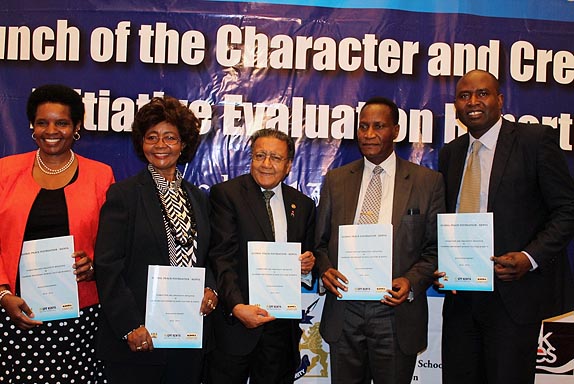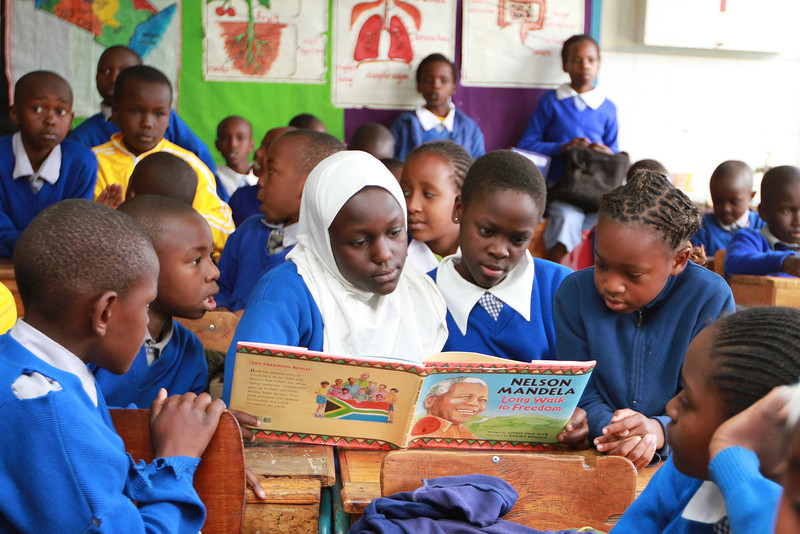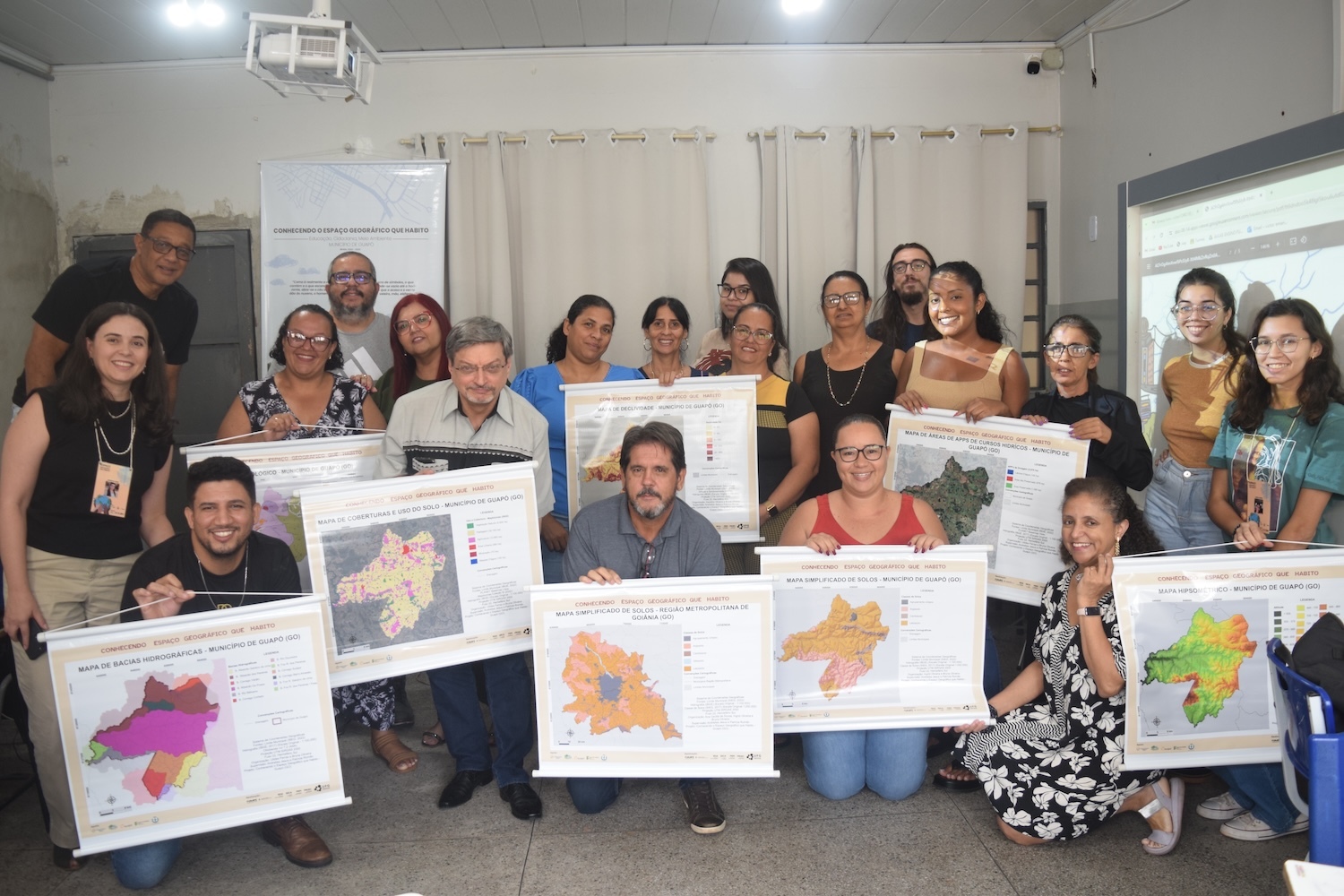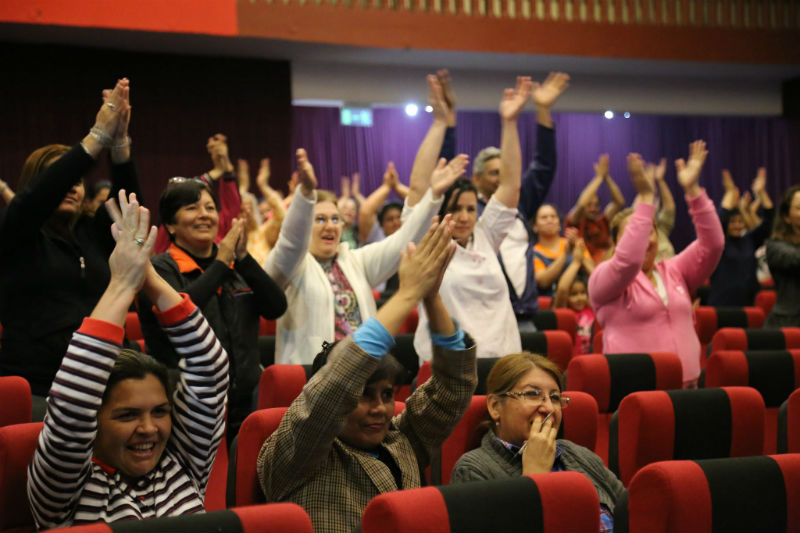
Principal sponsors at the release of the CCI report, from left: Mrs. Mary Kimonye, Chief Executive Officer, Brand Kenya Board; Prof. Leah Marangu, Chairperson, Character and Creativity Council; Dr. Manu Chandaria, Corporate Sponsor and Global Peace Foundation special advisor; Prof. Jacob Kaimenyi, Cabinet Secretary for Education; and Mr. Daniel Juma, Executive Director, Global Peace Foundation-Kenya.
Kenya set a global precedent earlier this year when the Ministry of Education introduced new guidelines that evaluate teachers and schools based on their ability to educate the “total child” by nurturing Character and Creativity, thus better equipping youth to be successful and contributing global citizens.
In a ground-breaking report released by the Kenya Ministry of Education, Global Peace Foundation, (GPF) and other partners on August 13, researchers from the Kenya Institute for Public Policy Research and Analysis (KIPPRA) found that nurturing character and creativity not only improves academic performance and culture but also reduces social problems such as violence, bullying and substance abuse in the schools.
KIPPRA is an autonomous public research institute that provides policy advice to the Kenyan government and other stakeholders to contribute to the achievement of national development goals.
The report, “Character and Creativity Initiative in Changing Secondary School Culture in Kenya,” found that the six pilot schools evaluated showed significant improvement for the last three years of CCI training. CCI engages administrators and teachers who intentionally work to improve school culture by modelling and building integrity and nurturing creativity in response to specific needs that arise in the school and home environment.
“When schools transform their school cultures then teachers are more satisfied, students are more motivated, academy performance in increased, disciplinary and social problems are decreased and graduating students are more employable.”
Prior to the implementation of CCI, the selected schools were facing numerous challenges that severely affected school morale and academic climate. These included low self-esteem, poor time management and goal setting, poor interpersonal relationships, negative peer pressure, drug abuse and alcoholism, stereotypes and prejudice, negative attitude towards education, lack of support in the surrounding community, negative attitude towards teachers, poor parenting, poor hygiene habits and absenteeism.

Students awarded certificates of excellence in various extra-curricula activities and academic performance at Maina Wanjigi Secondary School.
Since the initiative began, the report found that participating schools have seen improved academic and student achievement, reduced disciplinary issues, enhanced self-confidence among students, and overall improved school culture and climate as compared with the control schools. Moreover, it noted a reduction of social problems such as violence, bullying and substance abuse. The results indicate that the CCI intervention helped improve teachers’ practices, such as providing support and ensuring high engagement with students.
The study also found that students are modeling behaviors that contribute to a healthy lifestyle and recommended that teachers, parents and the school community need to work together towards a shared vision of ethics and excellence.
The report also recommended integration of national values in the school curricula as a pillar for building a culture of ethics and excellence to advance Kenyan and global citizenship. Finally, the study recommended scaling up the CCI initiative to extend its benefits to children and youth in the whole republic.
At a press briefing at the release of the report, Kenya Cabinet Secretary Prof. Jacob Kaimenyi commended the GPF-backed National Character and Creativity Council for their significant collaboration in changing school culture. “Academic development and character development are intertwined and inseparable,” Prof. Kaimenyi said.
He also praised the pilot schools for pioneering best practices such as the GPF initiative Power of 1 Percent for Change and Peace, which encourages students to donate 1 percent of their time, resources and energy to give back to the society. He urged all stakeholders to embrace the Power of 1 Percent in their respective lives.

Children in a CCI classroom in Kenya
Dr. Manu Chandaria, a major corporate donor and GPF Global Leadership Council member, and Prof. Kaimenyi also urged the government to invest in scaling up the CCI initiative in primary schools, secondary schools and institutions of higher learning based on the finding of the KIPPRA report. “Character is the basis of every human being and therefore it must start at the primary school level,” Dr. Chandaria said.
“When schools transform their school cultures then teachers are more satisfied, students are more motivated, academy performance in increased, disciplinary and social problems are decreased and graduating students are more employable,” said Dr. Tony Devine, director of LeadIn, an education initiative of the Global Peace Foundation.
For more information on the report and CCI initiative, please visit www.ccikenya.org and www.leadin.org
–Reported by Ms. Misco Mungai Executive Assistant, Global Peace Foundation Kenya



